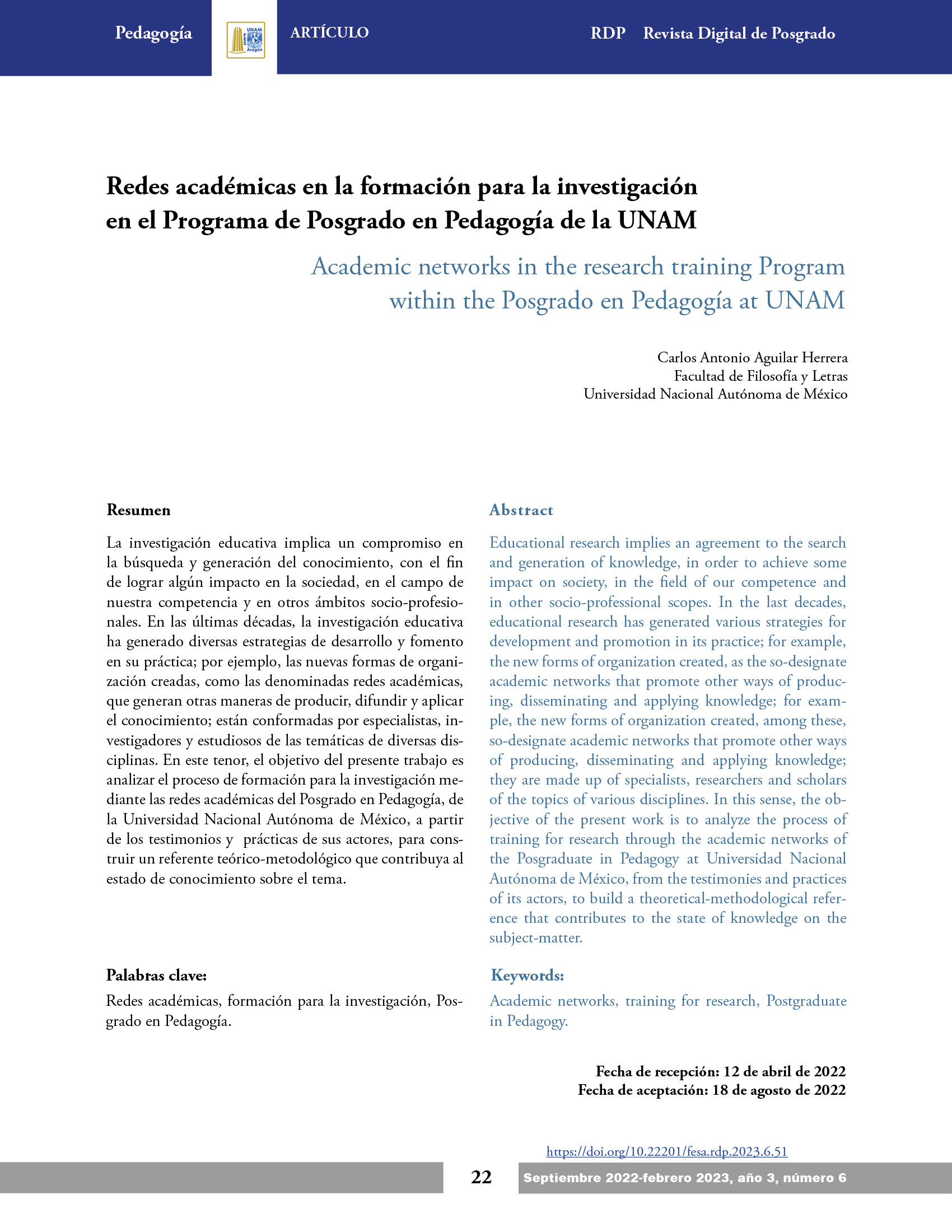Academic networks in the research training Program within the Pedagogy Postgraduate at UNAM
DOI:
https://doi.org/10.22201/fesa.rdp.2023.6.51Keywords:
Academic networks, training for research, Postgraduate in Pedagogy.Abstract
Educational research implies an agreement to the search and generation of knowledge, in order to achieve some impact on society, in the field of our competence and in other socio-professional scopes. In the last decades, educational research has generated various strategies for development and promotion in its practice; for example, the new forms of organization created, as the so-designate academic networks that promote other ways of producing, disseminating and applying knowledge; for example, the new forms of organization created, among these, so-designate academic networks that promote other ways of producing, disseminating and applying knowledge; they are made up of specialists, researchers and scholars of the topics of various disciplines. In this sense, the objective of the present work is to analyze the process of training for research through the academic networks of the Posgrado en Pedagogia of the Universidad Nacional Autónoma de México, from the testimonies and practices of its actors, to build a theoretical-methodological reference that contributes to the state of knowledge on the subject-matter.
References
Aguilar Herrera, C. A. (2022). Las redes académicas como mediadoras de la formación para la investigación: el caso de los alumnos de Posgrado en Pedagogía de la UNAM [Tesis de doctorado, Universidad Nacional Autónoma de México]. TESIUNAM Digital. http://132.248.9.195/ptd2022/mayo/0824898/Index.html
Consejo Mexicano de Investigación Educativa, A. C. (2003). La investigación educativa en México: usos y coordinación. Revista Mexicana de Investigación Educativa, 8(19), 847-898.
Gutiérrez, N. G. (2009). Comunidades especializadas en investigación educativa y producción de conocimiento. En N. G. Gutiérrez (Coord.), Redes, comunidades, grupos y trabajo entre pares en la investigación educativa (pp. 21-49). CRIM, UNAM; Plaza y Valdés.
Hinojosa Luján, R., Alfaro Rivera, J. A., Santos Rojas, M.A., Pérez Baltazar, E. T., Gutiérrez Solana, M. D. & Silva Beltrán, E. E. (2013). De comunidades académicas especializadas a comunidades epistémicas: un estado del conocimiento de las redes que fomentan la producción del conocimiento sobre educación. En M. López Ruiz, L. Sañudo Guerra & R. E. Maggi Yáñez (Coords.), Investigaciones sobre la investigación educativa 2002-2011 (pp. 393-444). Col. Estados del Conocimiento. Asociación Nacional de Universidades e Instituciones de Educación Superior; Consejo Mexicano de Investigación Educativa, A. C.
Jansen, H. (2013). La lógica de la investigación por encuesta cualitativa y su posición en el campo de los métodos de investigación social. Paradigmas, 5(1), 39-72.
Moreno, M. G., Sánchez, R., Arredondo, V. M., Pérez, G. & Klinger, C. (2003). Formación para la investigación. En P. Ducoing (Coord.), Sujetos, actores y procesos de formación. Tomo 1: Formación para la investigación, los académicos en México, actores y organizaciones 1992-2002 (pp. 41-111). Col. Estados del Conocimiento. Asociación Nacional de Universidades e Instituciones de Educación Superior; Consejo Mexicano de Investigación Educativa, A. C.
Poder Ejecutivo Federal. (1984, 26 de noviembre). Programa Nacional de Desarrollo Tecnológico y Científico. Diario Oficial de la Federación, 84-89.
Schmelkes del Valle, C. (2013). Formación para la investigación. En M. López Ruiz, L. Sañudo Guerra & R. E. Maggi Yáñez (Coords.), Investigaciones sobre la investigación educativa, 2002-2011 (pp. 337-391). Colección Estados del Conocimiento. Asociación Nacional de Universidades e Instituciones de Educación Superior; Consejo Mexicano de Investigación Educativa, A. C.

Downloads
Published
How to Cite
Issue
Section
License
Copyright (c) 2022 Universidad Nacional Autónoma de México

This work is licensed under a Creative Commons Attribution-NonCommercial-NoDerivatives 4.0 International License.




